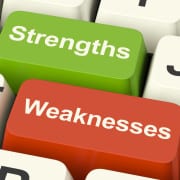Finders, minders, grinders, and binders
Have you heard this old saw? People used to say that law firms need four categories of lawyers: finders, minders, grinders, and binders. It’s still true to some degree, though today’s atmosphere requires lawyers to develop their skills in each of these areas, rather than simply selecting the most comfortable skill set and roosting there. So, let’s unpack what these labels mean… And then we’ll explore how a lawyer can identify her natural inclination, lead from that strength, and develop at least rudimentary skills in the areas that perhaps come less naturally.
First, definitions. Finders are those who find the work, better known today as rainmakers. Minders are those who perform administrative tasks and coordinate the efforts of the finders, grinders, and binders to be sure that the firm will run as a cohesive whole; examples include managing partners, the executive committee, team leaders, etc. Grinders are those who grind out the client work, and binders are those who bring the members of a firm together by (for example) inviting a small group to lunch or recognizing achievements of the firm’s lawyers.
Chances are that just reading these definitions is enough to let you identify your area of strength. If not, consider this brief list of questions.
* Imagine a great opportunity for your firm. Is the opportunity you thought of more in the practice, marketing, administration, or social area?
* Do you feel that you’re acting in the highest and best service by being out in the world meeting people, billing time, or working on firm matters?
* When you think you ought to drop by and congratulate a colleague on bringing in a big new client, winning a case, or receiving some award, do you actually do it?
* Would you gladly trade billable hours for working on administrative matters? Is administration important enough to do you take on both tasks?
* How skilled are you at signing new clients? Does your marketing tend to yield results fairly quickly?
Answers to these questions will point you toward your area of strength. Although most of us tend to spend time shoring up our weak areas and working to improve them, studies show that people are much more effective when they spend development time making those strengths even stronger and figuring out how best to use them. (This is the thesis of Now, Discover Your Strengths by Buckingham and Clifton, among others by Buckingham.) Accordingly, it’s critical to recognize and leverage your natural abilities.
As recognized in this Altman Weil report, a lawyer today likely doesn’t have the luxury of existing in only one dimension of the finder/minder/grinder/binder quartet. (The report is directed to partners, but equally applicable to associates and sole practitioners, albeit in a different context.) Though exceptions may exist by agreement of the members of a firm, each lawyer is asked to put each of these skills into play. Though it isn’t necessary to become a virtuoso in each area, it’s critical to have some level of skill.
Frederick Shelton, a legal recruiter, argues persuasively that lawyers acquire these skills at different stages of their development in this article. (It’s worth noting that Shelton considers minders to be those with responsibility for client contact — a reminder to check definition when somewhat arbitrary terms are being used.) Although seniority does bring opportunities to develop these skills, even the most junior associate can begin developing them today. How so?
Being a grinder is the expected role for a new(ish) lawyer, as the first few years out of school are focused on developing the craft of lawyering. It’s important not to skimp on that stage. However, there’s every reason to begin networking, which will lay the ground for development of finder skills. Likewise, it’s never inappropriate to congratulate others in your office on their accomplishments, to send a note when a family member dies, or to take on the other “binder” tasks that create a collegial sense. Finally, though it’s difficult to take on administrative tasks as a junior associate (though more possible in smaller firms), it’s incumbent on each lawyer to learn the business of the firm, which is step one toward acquiring the skills of a minder. Other opportunities for developing these areas will arise, particularly if you’ve trained yourself to be aware of them.
Today, identify your area of strength as a finder, minder, grinder, or binder, and then notice over the course of the week whether (and how) you perform tasks in the other areas. That’s step one in expanding your skills.




Leave a Reply
Want to join the discussion?Feel free to contribute!